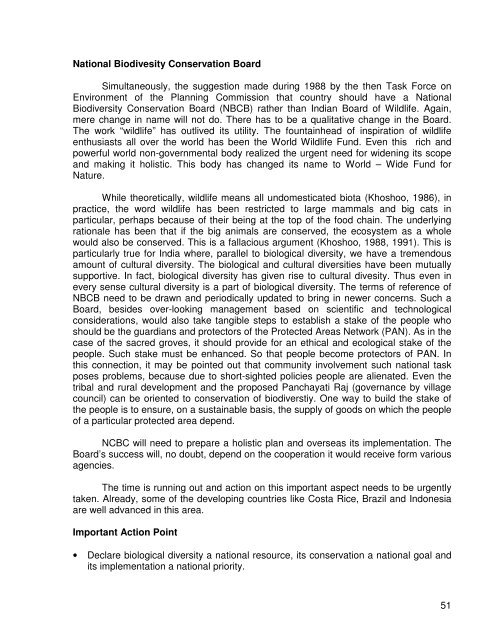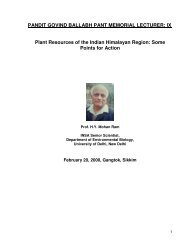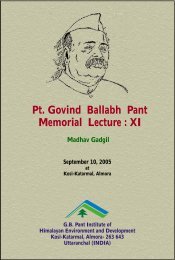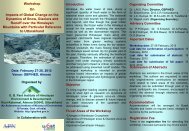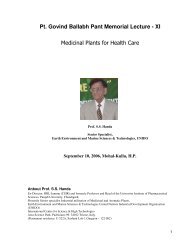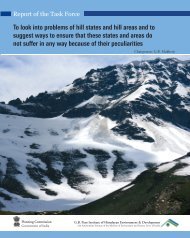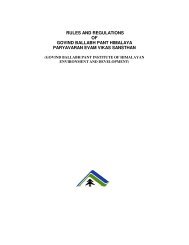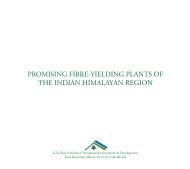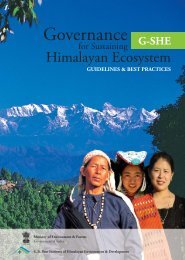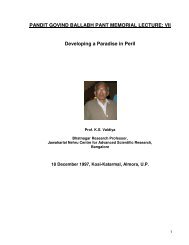Pandit Govind Ballabh Pant Memorial Lecture: II
Pandit Govind Ballabh Pant Memorial Lecture: II
Pandit Govind Ballabh Pant Memorial Lecture: II
Create successful ePaper yourself
Turn your PDF publications into a flip-book with our unique Google optimized e-Paper software.
National Biodivesity Conservation Board<br />
Simultaneously, the suggestion made during 1988 by the then Task Force on<br />
Environment of the Planning Commission that country should have a National<br />
Biodiversity Conservation Board (NBCB) rather than Indian Board of Wildlife. Again,<br />
mere change in name will not do. There has to be a qualitative change in the Board.<br />
The work “wildlife” has outlived its utility. The fountainhead of inspiration of wildlife<br />
enthusiasts all over the world has been the World Wildlife Fund. Even this rich and<br />
powerful world non-governmental body realized the urgent need for widening its scope<br />
and making it holistic. This body has changed its name to World – Wide Fund for<br />
Nature.<br />
While theoretically, wildlife means all undomesticated biota (Khoshoo, 1986), in<br />
practice, the word wildlife has been restricted to large mammals and big cats in<br />
particular, perhaps because of their being at the top of the food chain. The underlying<br />
rationale has been that if the big animals are conserved, the ecosystem as a whole<br />
would also be conserved. This is a fallacious argument (Khoshoo, 1988, 1991). This is<br />
particularly true for India where, parallel to biological diversity, we have a tremendous<br />
amount of cultural diversity. The biological and cultural diversities have been mutually<br />
supportive. In fact, biological diversity has given rise to cultural divesity. Thus even in<br />
every sense cultural diversity is a part of biological diversity. The terms of reference of<br />
NBCB need to be drawn and periodically updated to bring in newer concerns. Such a<br />
Board, besides over-looking management based on scientific and technological<br />
considerations, would also take tangible steps to establish a stake of the people who<br />
should be the guardians and protectors of the Protected Areas Network (PAN). As in the<br />
case of the sacred groves, it should provide for an ethical and ecological stake of the<br />
people. Such stake must be enhanced. So that people become protectors of PAN. In<br />
this connection, it may be pointed out that community involvement such national task<br />
poses problems, because due to short-sighted policies people are alienated. Even the<br />
tribal and rural development and the proposed Panchayati Raj (governance by village<br />
council) can be oriented to conservation of biodiverstiy. One way to build the stake of<br />
the people is to ensure, on a sustainable basis, the supply of goods on which the people<br />
of a particular protected area depend.<br />
NCBC will need to prepare a holistic plan and overseas its implementation. The<br />
Board’s success will, no doubt, depend on the cooperation it would receive form various<br />
agencies.<br />
The time is running out and action on this important aspect needs to be urgently<br />
taken. Already, some of the developing countries like Costa Rice, Brazil and Indonesia<br />
are well advanced in this area.<br />
Important Action Point<br />
• Declare biological diversity a national resource, its conservation a national goal and<br />
its implementation a national priority.<br />
51


